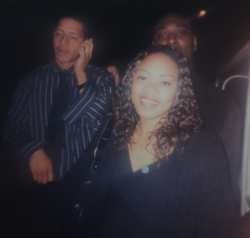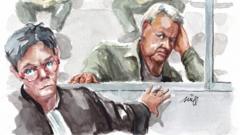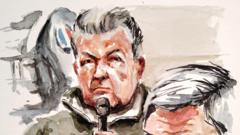This article explores Gisèle Pelicot's emotional evolution from a rape victim shrouded in shame to a courageous advocate for others who have suffered similar abuse as she faces her past in court.
**From Darkness to Light: Gisèle Pelicot’s Journey of Resilience in a Historic Rape Trial**

**From Darkness to Light: Gisèle Pelicot’s Journey of Resilience in a Historic Rape Trial**
An in-depth look at Gisèle Pelicot’s transformative experience in a high-profile trial against her ex-husband and multiple abusers.
Gisèle Pelicot lifts her sunglasses and chooses to fight back. In a poignant moment during her trial, Gisèle decided it was time to remove her sunglasses, not merely a response to the autumn sun shining in Avignon, but a symbol of her transformation—from a serene grandmother to an empowered rape victim willing to confront her past. For two years, her lawyer Stéphane Babonneau has guided Pelicot through the harrowing legal battle against her ex-husband Dominique and fifty other alleged abusers.
Despite her initial fear and shame, Pelicot's resilience has been evident throughout the proceedings. She has mostly refrained from public commentary, but Babonneau has shared insights into her strength and determination. A significant moment in the trial was when Pelicot, after much contemplation, agreed to view disturbing video evidence collected from her husband's hard drive. In view of the grotesque content, her inquiry, "How could he?" echoed through the courtroom while she demonstrated remarkable composure.
The journey has been one of immense strength, where Pelicot actively chose to confront the past. She realized the significance of the videos as pivotal evidence for her case, indicative of her desire to regain control over her narrative. Her decision to pursue a public trial was rooted in a pragmatic concern about facing her abusers in a confined courtroom; she felt a public setting would be less threatening.
The trial commenced with immense emotional difficulty, as Pelicot first met her ex-husband’s gaze across the crowded room. While he admitted to the abuse and sought forgiveness, Pelicot’s path to healing remains arduous. Babonneau emphasized her inability to forgive, stating that while they once shared a profound love, the betrayal was insurmountable.
Defense attorneys attempted to undermine her credibility, targeting her emotional demeanor. “When a victim doesn’t cry, or cries too much, there is always something to criticize,” Babonneau noted with exasperation. But Pelicot remained undeterred—she braved the courtroom, confident in her resilience shaped by prior experiences.
To her surprise, the public and media attention did not wane. Encouraged by the support, letters, and gifts from strangers, Pelicot began to feel a sense of responsibility towards others who have endured similar trauma. Acknowledging the rarity of her evidence, she affirmed her intention to represent the countless victims who quietly suffer.
While Pelicot harbors a desire for privacy in the future, she may consider sharing her story more broadly to raise awareness about issues of drugging and sexual assault. Her introspection led her to reflect on past moments with her husband, choosing to concentrate on the happier memories rather than the trauma they’ve endured.
Psychiatrists may describe Dominique Pelicot as a typical high-functioning narcissist, but for Gisèle, it is simpler to view him as containing two contradictory personas. With encouragement from her legal team, she has begun to reclaim her life, even as the painful legacy of her past persists. The knowledge that her experience can guide and uplift others offers a glimpse of hope as she moves forward in her journey of healing.
Despite her initial fear and shame, Pelicot's resilience has been evident throughout the proceedings. She has mostly refrained from public commentary, but Babonneau has shared insights into her strength and determination. A significant moment in the trial was when Pelicot, after much contemplation, agreed to view disturbing video evidence collected from her husband's hard drive. In view of the grotesque content, her inquiry, "How could he?" echoed through the courtroom while she demonstrated remarkable composure.
The journey has been one of immense strength, where Pelicot actively chose to confront the past. She realized the significance of the videos as pivotal evidence for her case, indicative of her desire to regain control over her narrative. Her decision to pursue a public trial was rooted in a pragmatic concern about facing her abusers in a confined courtroom; she felt a public setting would be less threatening.
The trial commenced with immense emotional difficulty, as Pelicot first met her ex-husband’s gaze across the crowded room. While he admitted to the abuse and sought forgiveness, Pelicot’s path to healing remains arduous. Babonneau emphasized her inability to forgive, stating that while they once shared a profound love, the betrayal was insurmountable.
Defense attorneys attempted to undermine her credibility, targeting her emotional demeanor. “When a victim doesn’t cry, or cries too much, there is always something to criticize,” Babonneau noted with exasperation. But Pelicot remained undeterred—she braved the courtroom, confident in her resilience shaped by prior experiences.
To her surprise, the public and media attention did not wane. Encouraged by the support, letters, and gifts from strangers, Pelicot began to feel a sense of responsibility towards others who have endured similar trauma. Acknowledging the rarity of her evidence, she affirmed her intention to represent the countless victims who quietly suffer.
While Pelicot harbors a desire for privacy in the future, she may consider sharing her story more broadly to raise awareness about issues of drugging and sexual assault. Her introspection led her to reflect on past moments with her husband, choosing to concentrate on the happier memories rather than the trauma they’ve endured.
Psychiatrists may describe Dominique Pelicot as a typical high-functioning narcissist, but for Gisèle, it is simpler to view him as containing two contradictory personas. With encouragement from her legal team, she has begun to reclaim her life, even as the painful legacy of her past persists. The knowledge that her experience can guide and uplift others offers a glimpse of hope as she moves forward in her journey of healing.




















